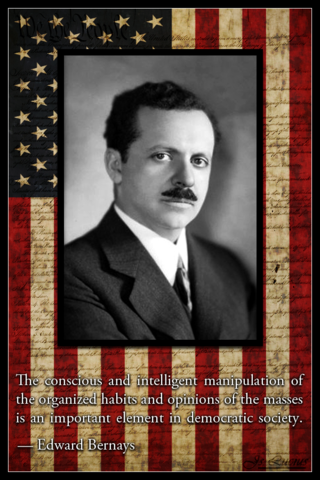Freudian Psychology
Edward Bernays, Uncle Freud, and Betty Crocker
The plague of self-consciousness
Posted April 6, 2016

There once was a man by the name of Edward Bernays who took his uncle’s theories and practices of psychology (and the subconscious) and applied them to the world of public relations. His uncle was Sigmund Freud and Bernays came to be known as the founder of public relations in the US. He lived the latter part of his life in Cambridge, MA only blocks from the Humanist Hub where I write this.
The conscious and intelligent manipulation of the organized habits and opinions of the masses is an important element in democratic society. Those who manipulate this unseen mechanism of society constitute an invisible government which is the true ruling power of our country. ...We are governed, our minds are molded, our tastes formed, our ideas suggested, largely by men we have never heard of...Edward Bernays
Bernays' impact on how we are seduced into consuming has left a very deep and exacting legacy. For example, when the tobacco industry needed to expand its customer base, Bernays made cigarette smoking popular among women by placing cigarettes into the hands of women in fashion, stage, and film. He knew that as human beings we emulate and model ourselves around those who we think are beautiful, popular, famous, and otherwise wonderful.
He was also responsible for making bacon a staple of the American breakfast diet. When the pork industry needed to find a way to expand the market for their product, they went to Bernays. He fashioned the narrative that bacon and eggs for breakfast was the right way to provide for your loved ones in the morning in preparation for a full day of work. Today bacon and eggs is a staple of breakfast menus throughout the United States.
One of my favorite stories is how Bernays was approached to find out why a new product category, instant cake-mix, was not selling well. This formula was developed during WWII to create foods by simply adding water to premixed dry ingredients and then cooking or baking. Bernays declared that an “egg” was needed in the recipe. Psychologically, he argued (straight from his uncle’s theory), adding an egg to the recipe provided the mother to symbolically give her egg to the family...more likely, the additional step allowed the baker to feel as if she (at that time) was doing more than just adding water to complete a cake recipe. Sales thereafter skyrocketed.
Bernays also began the insidious practice of selling products by playing to our needs for social acceptance and our fears of rejection. He created the framework still used today: purchasing the offered product would alleviate the anxiety (often previously not part of one’s conscious experience) of the consumer. Today we are told that if we don’t have white teeth, fresh breath, are odor free or sweat free, that we are candidates for rejection and are at a much decreased competitive advantage. Think about the messages you receive from advertising with regularity:
- Never let them see you sweat
- For fresher breath and whiter teeth
- Lose (up) to 10 pounds in 1 month
- Feel the power
- The Freshmaker
- Keeps on Going, and Going, and Going….
Is it a surprise that the term “selfies” (taking photos of oneself instead rather than of other subjects or scenery) and posting the pictures on social media has become so quickly integrated into daily life? The focus on the self is something that has been carefully groomed for advertising purposes for a long-time.
Here is the problem: we know that the way to make oneself unhappiest is to focus on the self. Those who are able to get outside of themselves in the service of others generally report a greater sense of well-being. Individuals report the greatest sense of unhappiness when focused on the self. This self-conscious grooming has worked well in selling products, but has left many of us overly focused on the self and how others perceive us.
The popularity of social media only reinforces this. Social media (with many amazing and good aspects) provides an opportunity to groom a certain image of the self...it is often a narrative of the ideal self. But it is still a narrative that focuses on the crafting of the self and taking time to curate and deploy that narrative for others to consume.
People will often ask me what the formula is for greater happiness. There is of course not a formula, however research in the past 20 years is surfacing means to move us to a greater sense of well-being. I do have an answer that simply echoes that of many traditions and civilizations: get out of your own way and do for others. This can take so many forms through teaching, mentoring, volunteering, service, and so forth. Avoid spending too much of your daily life in the world of self-consciousness.




